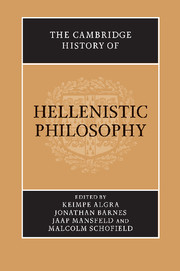Book contents
- Frontmatter
- PART I INTRODUCTION
- PART II LOGIC AND LANGUAGE
- PART III EPISTEMOLOGY
- 7 Introduction: the beginnings of Hellenistic epistemology
- 8 Epicurean epistemology
- 9 Stoic epistemology
- 10 Academic epistemology
- PART IV PHYSICS AND METAPHYSICS
- PART V ETHICS AND POLITICS
- Synopsis of principal events
- Editions of sources and fragments
- List of abbreviations
- Bibliography
- Index locorum
- General Index
- References
8 - Epicurean epistemology
from PART III - EPISTEMOLOGY
Published online by Cambridge University Press: 28 March 2008
- Frontmatter
- PART I INTRODUCTION
- PART II LOGIC AND LANGUAGE
- PART III EPISTEMOLOGY
- 7 Introduction: the beginnings of Hellenistic epistemology
- 8 Epicurean epistemology
- 9 Stoic epistemology
- 10 Academic epistemology
- PART IV PHYSICS AND METAPHYSICS
- PART V ETHICS AND POLITICS
- Synopsis of principal events
- Editions of sources and fragments
- List of abbreviations
- Bibliography
- Index locorum
- General Index
- References
Summary
Canonic
The two main issues of Epicurean epistemology may be put as follows: what is the foundation of knowledge; and how is knowledge built on this foundation? There is general agreement that Epicurus proposed to rely on sensory observations as a means of knowing what is unobserved. But there is much debate on the extent to which he proposed to rely on empirical observations, on what he took to be the basic objects of observation, and on how he proposed to proceed from sensory information to the discovery of what is not perceived by the senses.
It has been argued that Epicurus proposed to use empirical observation as the only means of determining the truth or falsity of beliefs. He set out two rules of investigation at the beginning of his physics requiring that the truth and falsity of beliefs rest entirely on sensory observations. The two rules consist of a demand for empirical concepts and a demand for empirical data. The latter consist of uninterpreted, or what may be called ‘raw’ or ‘incorrigible’, acts of perception. Epicurus proposed to infer all truths about the physical world and human happiness from this incorrigible foundation.
Against this interpretation, it has been held that Epicurus was not nearly as methodical in his use of empirical observations. Rather, he accepted many nonempirical claims, while proposing to support theories (much like Aristotle) by agreement with perception. Although he supposed that all perceptions are in a sense incorrigible, Epicurus singled out what are ordinarily called true perceptions as the basis for checking scientific theories.
- Type
- Chapter
- Information
- The Cambridge History of Hellenistic Philosophy , pp. 260 - 294Publisher: Cambridge University PressPrint publication year: 1999
References
- 8
- Cited by



